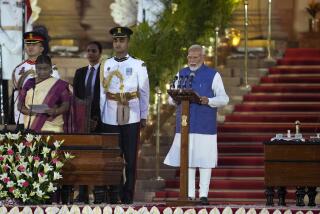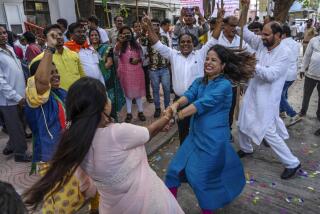Gandhi on Track to Being India’s Premier
NEW DELHI — Italian-born Sonia Gandhi plans to be sworn in as India’s prime minister this week even as Hindu nationalists threaten to launch street protests if she becomes the country’s leader.
Gandhi’s Congress Party and its allies elected her leader of an alliance that will form the core of a new government, one of her top party officials, Manmohan Singh, told reporters here Sunday.
Gandhi is set to visit Indian President A.P.J. Abdul Kalam today and officially declare that she will form a coalition government.
Singh’s announcement followed a 2 1/2-hour meeting between Gandhi, senior leaders of her party and its allies. Participants included top officials of the Communist Party of India (Marxist) -- which won a significant share of seats in the Lok Sabha, the lower house of Parliament -- and the Nationalist Congress Party, which argued during the recent campaign that Gandhi’s foreign birth made her unsuitable for prime minister.
Gandhi is the widow of Rajiv Gandhi, a former Indian prime minister who was assassinated by a suspected Tamil suicide bomber at a campaign rally in 1991. Sonia Gandhi is an Indian citizen, but she would be the first foreign-born person to lead India, the world’s largest democracy, if she becomes prime minister.
Her Congress Party and its allies on Thursday defeated Prime Minister Atal Behari Vajpayee in one of the biggest electoral upsets since India gained independence from Britain in 1947. Vajpayee then resigned. His Hindu nationalist supporters attacked Gandhi for her foreign roots during the election campaign and are threatening to take to the streets if she assumes power.
The vice president of Vajpayee’s Bharatiya Janata Party, Babulal Marandi, said, “It will be a black day for the country.” The senior BJP leader said he might call for nationwide demonstrations against Gandhi.
“In the prevailing situation, people will have to fight the second freedom struggle. We will do whatever is needed to create public awareness on the issue,” Marandi said.
The central committee of the Communist Party of India (Marxist) debated Sunday whether to join a government led by Gandhi and her Congress Party or remain outside the government and provide crucial support in parliamentary votes.
The Communist Party’s leadership was also trying to decide the details of basic policies, called a common minimum program, that they will insist the government adopt in exchange for backing from left-wing parties.
But the Communists and other groups on the left declared their support for Gandhi and her government in letters handed to her Sunday, said Singh, a former finance minister. Singh is considered a front-runner to regain his old job in an eventual Gandhi administration.
Businesspeople and investors were worried that the new government would slow reforms that have opened India to more private capital and foreign trade. Gandhi has said she was committed to continuing economic reforms but wanted to ensure that India’s poor shared more of the benefits.
Congress Party officials argue that Vajpayee’s government exaggerated its claim to be India’s economic savior, and official statistics show that average annual growth was stronger before Vajpayee took power in 1996.
A Congress Party government began economic reforms in 1991 and achieved an average annual growth rate of about 6.5% until Vajpayee and his allies came in.
Although growth has surpassed 8% this year, the economy has averaged less than 6% growth under Vajpayee.
Pranab Mukherjee, a former finance and foreign minister and a member of the committee drafting the common platform of Gandhi’s alliance, said the Congress Party had established key policy trends but the BJP and its allies claimed the credit.
More to Read
Sign up for Essential California
The most important California stories and recommendations in your inbox every morning.
You may occasionally receive promotional content from the Los Angeles Times.










